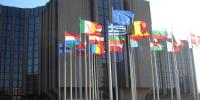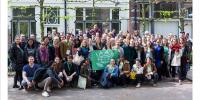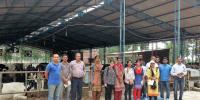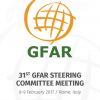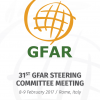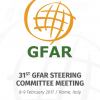Steering Committee members begin mobilizing their networks to action
A lot has happened in GFAR over the last three months. With the Partners in GFAR taking the lead, the foundation for a renewed GFAR has been laid—a new governance structure that ensures the voices of stakeholders from across all sectors are included in developing agriculture and food innovation systems for a sustainable future. Through an open and inclusive process, the Partners in GFAR themselves selected their representatives last December, including both global networks and local grassroots representative seats. Find out who’s representing you in the new GFAR Steering Committee here!

During a dynamic two-day meeting in Rome on 8-9 February, the first meeting of this newly formed GFAR Steering Committee introduced both new and renewed members and the vast constituencies they represent in GFAR. Together, they set the agenda for this unique global forum on agri-food research and innovation.
Meeting sessions helped build a common understanding of GFAR’s role and purpose towards meeting the Sustainable Development Goals (SDGs), and how each SC member can best mobilize their respective constituencies, with others, into their desired GFAR collective actions.
GFAR offers a fantastic platform for multi-sectoral solutions to complex problems. -Shantanu Mathur, IFAD
By discussing and learning from the challenges encountered in previous networked actions, and through different group work activities, the Committee recognized that the SDG challenges could not be addressed by any one constituency alone. There are certain key constraints to greater impact from agricultural research and innovation around the world and all require collective action for success. To address these, the SC identified the following GFAR key focus areas in 2018-2021:
- Enable and empower sustainable rural communities
- Increasing knowledge flow for development impact
- Supporting transformative learning and youth leadership development
- Changing value systems and metrics to deliver the SDGs
- Enabling sustainable rural enterprise
For more information about these focus areas, please refer to the Key Points Summary for the GFAR Steering Committee members to share with their constituency, translated in 6 languages, in the Documents section below.
This is a very exciting time for GFAR. We are moving quickly towards formulating our next GFAR Medium-Term Plan based on the above framework. The members of the Steering Committee are ready to act on their commitment to catalyze the Partners in GFAR into key collective actions in these areas.
GFAR is the mechanism to join efforts and build bridges, for research and communities to work together. -Ren Wang, FAO
To keep up the momentum, it was agreed that the Steering Committee will meet again in May 2017—by which time Partners will have themselves identified their specific desired collective actions—to draw up GFAR's new Medium-Term Plan.
"GFAR should be publicly recognized and we should all be proud to label our actions as GFAR collective actions, and to present them as such to potential partners and donors” -JL Restrepo, GFAR Chair
Take some time to watch the interviews below with some of the SC members to see how they want to work together towards the shared goals of GFAR. And stay tuned in the coming months for updates on GFAR's new collective agenda for action!
GFAR is an open and inclusive movement for change, open to all who share in our common purpose of advocating for, and catalyzing Collective Actions to strengthen and transform agri-food research and innovation systems, so that they are more effective in sustainable development. GFAR Update is a briefing service from the GFAR Secretariat. Our aim is to keep you regularly informed and aware of new initiatives and collective actions of the Partners in GFAR around the world, so that these can have greater reach and impact for those we serve - in particular for poor smallholder farmers and consumers.








